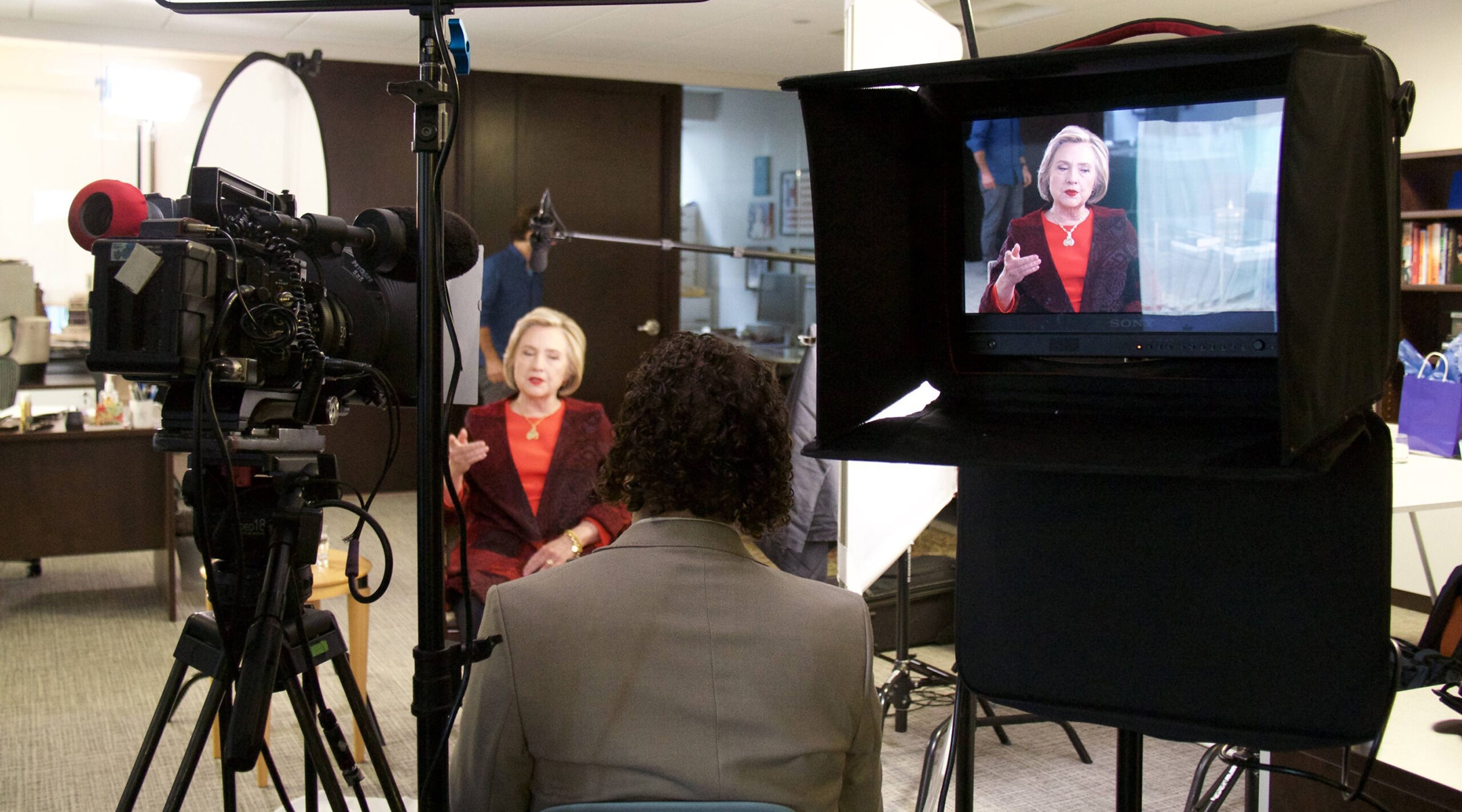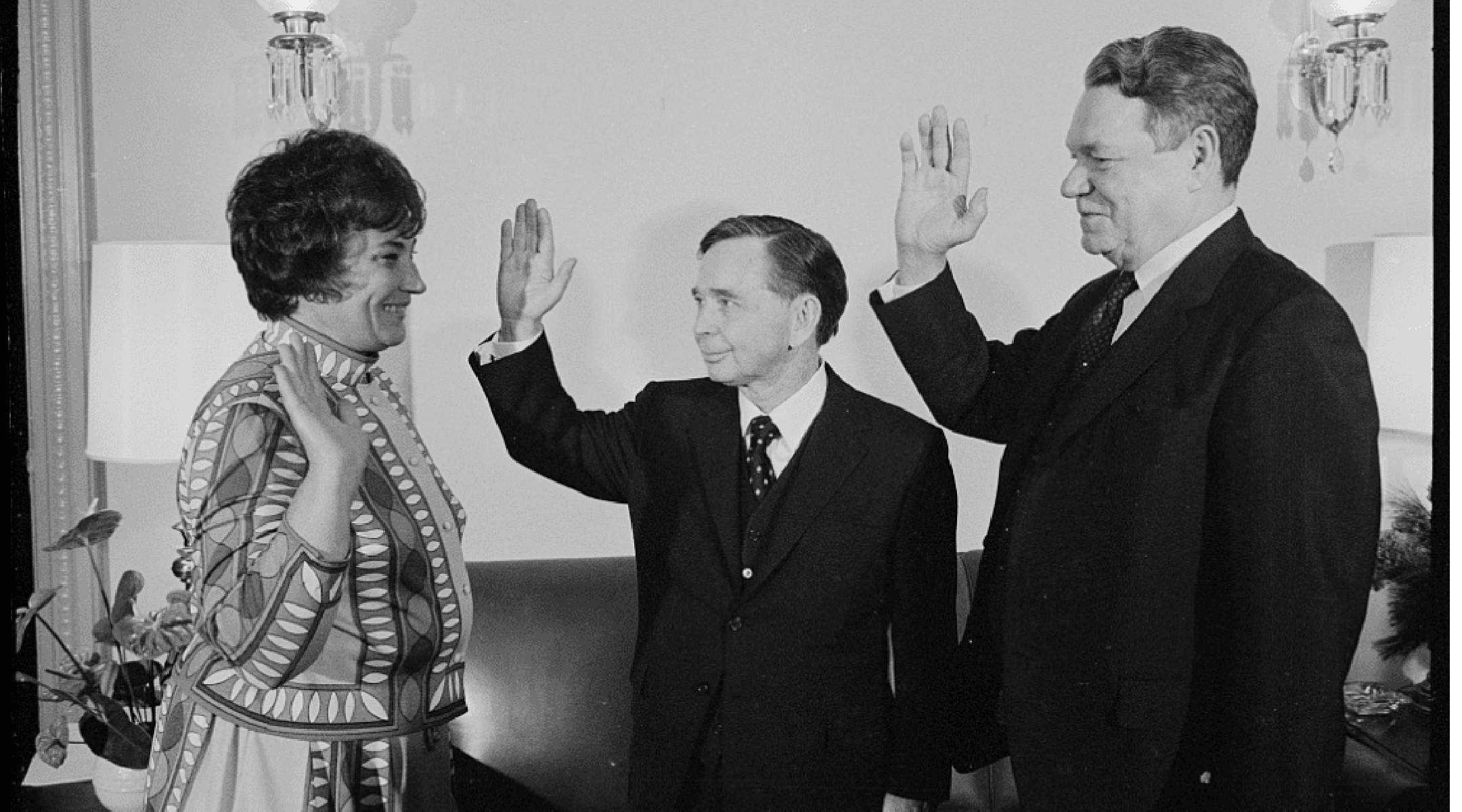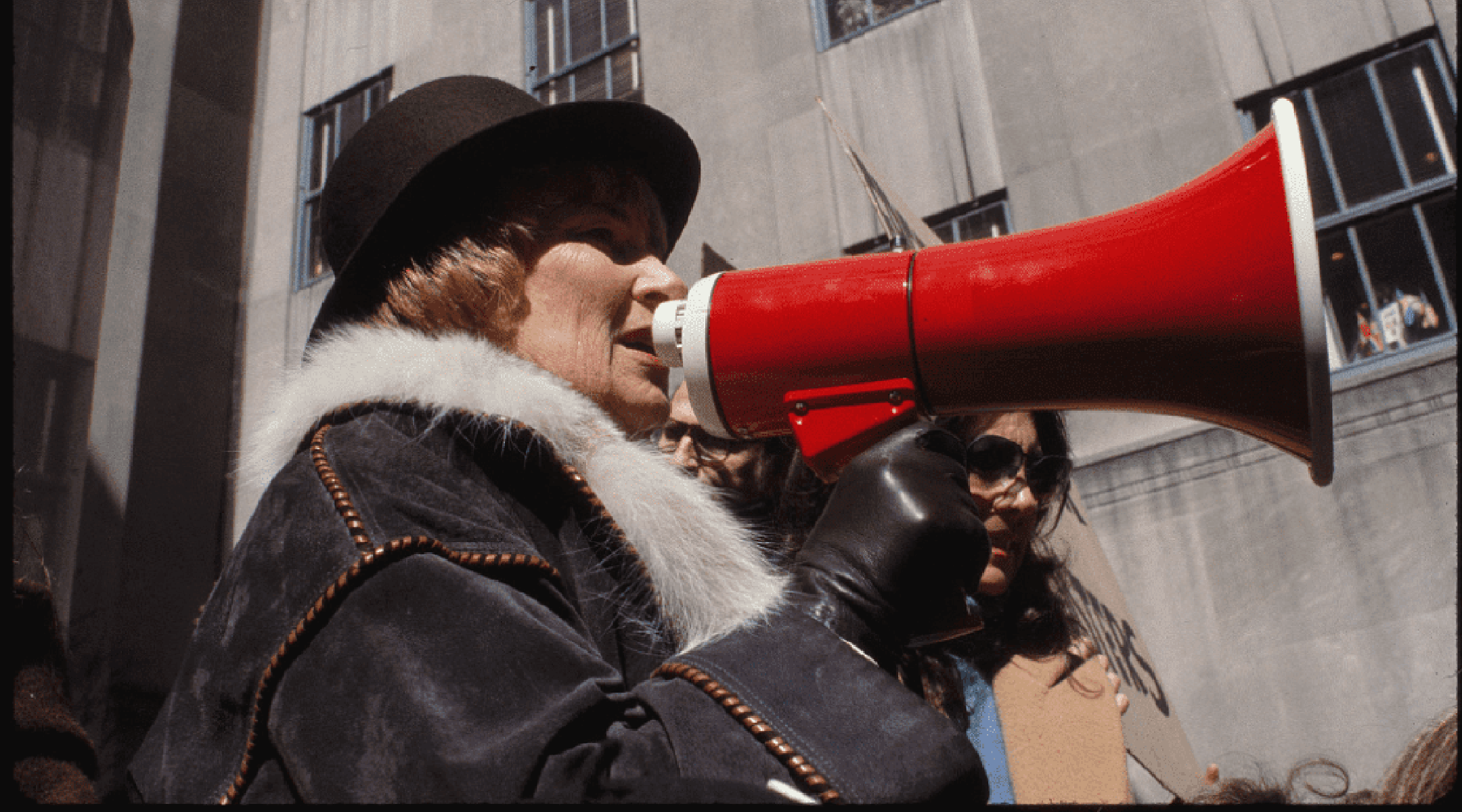(JTA) — Bella Abzug, the feminist who burst into Congress battling for equal rights in 1970, was often caricatured in the media of her time. She was labeled “belligerent” and “bellicose Bella” in newspapers, parodied on television and shamed for everything from her body to her Jewishness to her signature wide-brimmed hats.
In just six years as a New York Representative, Abzug demanded the withdrawal of U.S. forces from Vietnam, wrote legislation to protect the environment and fought discrimination against women, LGBTQ people and Black Americans. But five decades later, her name is far less known than those of some of her peers in the second wave feminist movement — such as journalist Gloria Steinem and “The Feminine Mystique” author Betty Friedan.
Jeff L. Lieberman hopes to finally pay her due with his documentary “Bella!,” opening in New York City and Los Angeles theaters on Friday. Lieberman interviewed several women in politics and the arts who credit Abzug with blazing a path for them to follow, even though their names are more famous than hers: Steinem, Hillary Clinton, Barbra Streisand, Shirley MacLaine, Nancy Pelosi and Maxine Waters are a few of the heavy hitters.
Lieberman started learning about Jewish feminists as a child in Vancouver, Canada — and not only from his mother, who became the family’s earner while his father assumed household duties in the 1980s. Their shelves were lined with books by Jewish feminists such as Letty Cottin Pogrebin and Anita Diamant. They sang songs by Debbie Friedman and proudly watched Steinem on the news. Yet Abzug’s name was hardly mentioned, he told the Jewish Telegraphic Agency.
“Looking back on it, she should have been this huge Jewish hero for all of us — a Jewish woman in Congress who was really sticking it to the institution,” said Lieberman, whose previous documentaries include “The Amazing Nina Simone” and “Re-Emerging: The Jews of Nigeria.” “Had the press been more fair and less misogynistic, we probably would have known Bella throughout a lot of Jewish households in the ‘80s. But because she was cast as a slightly odd figure, yelling with a hat, we didn’t really know her. ”
Abzug’s Jewish upbringing was central to the development of her progressive politics, according to Leandra Zarnow, who is interviewed in the documentary and wrote “Battling Bella: The Protest Politics of Bella Abzug.”
Abzug was born to Russian-Jewish immigrants in the Bronx in July 1920, one month before women won the right to vote. As a child, she was looked after by her grandfather Wolf Taklefsky, an Orthodox Jew who took her to synagogue and loved showing off her aptitude for learning Hebrew.

Hillary Clinton is a featured speaker in “Bella! This Woman’s Place is in The House.” (Courtesy of Re-Emerging Films)
“At the core, Bella Abzug was fueled by a sense of commitment to ‘tikkun olam,’ the idea of repairing the world,” Zarnow told JTA. “All of her elders really instilled in her that she needed to do unto others better than done unto her, so her social justice and her ethical core really were fired by that idea.”
When Abzug was in junior high in the early 1930s, she became involved in Hashomer Hatzair, a Labor Zionist youth movement with the Marxist ideal of a binational Jewish-Arab worker state. At 12 years old, she was already so enraptured by political organizing that she disobeyed her father’s curfew to make her first speeches at New York City subway stops.
“In the 1960s and ‘70s, Bella Abzug is very much an ally to the Black Power movement and other types of ethnic nationalist movements, because of the fact that she came into her politics and her own sense of self-determination through Hashomer Hatzair,” said Zarnow.
Abzug’s father died unexpectedly when she was 13. She decided to say Kaddish for him, a mourning prayer traditionally recited by male children for 11 months after a loved one’s death. Abzug had no male siblings and did not hesitate to take over the prayer every day at the front of her Orthodox synagogue.
“They looked askance at me for doing that,” Abzug said in a recording played in the documentary. “Nobody embraced me, no one said ‘how wonderful’ or helped me. I sort of stood there by myself, isolated… And it was in those early days behind the curtain [separating men and women in Orthodox synagogues] that I probably got my first ideas of feminism.”
Before running for office, Abzug was for 25 years a lawyer focused on defending the rights of labor union workers, Black Americans and individuals targeted by the House Un-American Activities Committee during the McCarthy era. Facing sexism as a young attorney, Abzug started wearing her trademark floppy hats to distinguish that she was not anyone’s secretary.
In one of her best-known cases, she defended Willie McGee, a Black man who was accused of raping a white woman in Mississippi and sentenced to death in 1945. The all-white, all-male jury presented a guilty verdict in two-and-a-half minutes.
The case took an enormous personal toll. In Jackson, where McGee was tried, a local newspaper wrote that “they should burn Willie McGee’s white woman lawyer along with him in the electric chair.” Abzug traveled to Jackson at eight months pregnant and found that no hotel would let her stay. Fear struck her when a taxi driver said he knew a place “far from town” where he was prepared to take her. She spent that night in a bus station bathroom, where she miscarried, before appearing in court the next morning.
She won a stay of execution, but the U.S. Supreme Court refused to hear McGee’s final appeal. He was killed in an electric chair in 1951.
In 1961, Abzug co-founded Women Strike for Peace, which drew about 50,000 women to the streets to protest the testing of nuclear weapons. The group helped push a nuclear test ban treaty signed by the United States and the Soviet Union, and it later shifted its focus to ending the Vietnam War.
Abzug then won a seat in Congress at age 50 in 1970, becoming one of only 12 women in the 435-member House of Representatives. In Washington, she co-authored the Water Pollution Act of 1972 (now known as the Clean Water Act), then the country’s most comprehensive environmental legislation. She introduced the Equal Credit Act of 1974 — which gave women the economic independence to apply for credit cards and loans in their own names — and the first bill to protect gay people from discrimination in U.S. history, which won only a handful of votes.

Bella Abzug was sworn into Congress on Jan. 21, 1971. (Courtesy of Marion S. Trikosko, Library of Congress)
As chair of a subcommittee on government information and individual rights, she co-authored the Freedom of Information Act, the Right to Privacy Act and the Government in the Sunshine Act that required government hearings to be held in public. While calling CIA Director William Colby to testify, she discovered that the CIA had been spying on her for about 30 years. She was also the first member of Congress to call for President Richard Nixon’s impeachment and helped pass a bill to defund the Vietnam War.
In 1976, Abzug took the risk of giving up her House seat to run for Senate, which at the time did not contain any women. She lost in the primary to Daniel Patrick Moynihan by less than 1%. More losses followed in her races for mayor of New York City and Congress again, as cultural tides shifted to the right and Reaganism halted progressive strides in the 1980s.
Still, she never stopped fighting for her agenda on different stages. In the last two decades of her life, she presided over the first National Women’s Conference in Houston, founded the grassroots political action group Women USA and turned to international politics, transforming the United Nations’ efforts to empower women across the globe as president of the Women’s Environmental and Development Organization (WEDO).
The politically and culturally powerful women interviewed in “Bella!” saw themselves as Abzug’s children, according to Lieberman. Her biological children Eve and Liz Abzug, who are also interviewed, said she tirelessly pushed for her causes at the cost of her personal life.
All of the women interviewees described paying a long overdue tribute to a woman whose shoulders they stood on, who sometimes shattered herself along with the glass ceiling.
“They just knew that she really opened the door and blazed in and had to make a lot of sacrifices for being one of the first,” said Lieberman. “She sacrificed her own career, her own likability, her own personal joy because she had to be a tough person and go headfirst into institutions.”
JTA has documented Jewish history in real-time for over a century. Keep our journalism strong by joining us in supporting independent, award-winning reporting.






